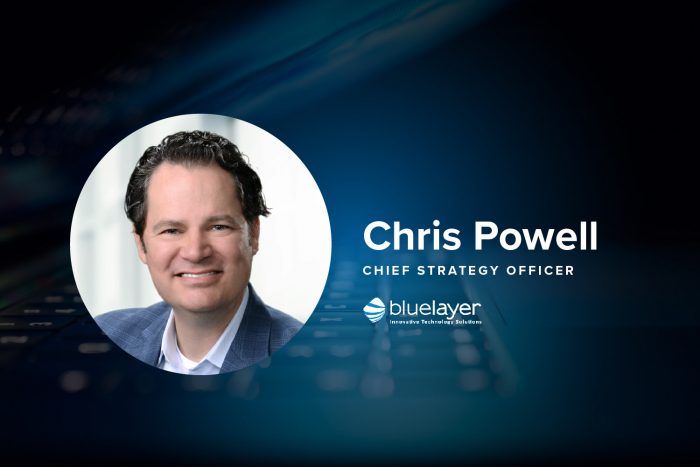If you’re new to (or still only vaguely familiar with) the Managed Service Provider (MSPs) world, it can be difficult to determine whether or not the information you’ve found online is the most accurate, up-to-date, or reliable. What do all the terms mean? How do you know that what you’re looking for is actually what you need? And if it’s ever-changing, how can your business hope to keep up? Some questions are easy to answer with just a peek behind the curtain, and that’s exactly what Blue Layer is here to do for you.
Who better to learn from than those who are on the front lines? In this Blue Layer employee spotlight, we’re speaking with Chris Powell, MSP veteran and Blue Layer CSO, about how he defines MSPs, why they’re vital to a business, and what he thinks business owners should know about them in 2022 and beyond.

BL: How would you describe an MSP to someone who has never heard that phrase? Why would you say that they are important assets to have?
CP: A MSP is a technology support company. MSPs provide a multitude of services including server and networking support, desktop and software support, telephone and communication platforms, mobility and remote connectivity, backup and disaster recovery services, cybersecurity defenses (software, hardware, testing, and training), email and web services support, and more.
A quality MSP has a full staff of various IT specialists and engineers to provide the full scope of IT support for an organization. MSPs are able to bring more services at a higher quality and at a cheaper price than most organizations can afford to hire directly.
BL: What would you say are the most commonly sought-after MSP services?
CP: Employee desktop support and troubleshooting, cybersecurity services, and remote and cloud capabilities.
BL: What does the typical day-to-day look like for a managed service provider?
CP: A high volume of quick response to immediate needs of clients (this is handled by our team of support technicians) as well as large-scope projects for networking, application, and infrastructure enhancements (this is handled by our engineering teams).
BL: What were your biggest takeaways regarding MSPs in 2021? What implications do you think those have on the future of MSPs throughout the rest of 2022 and beyond?
CP: MSPs needed to have the ability to respond quickly with proven solutions to assist businesses migrating from their brick-and-mortar establishments to conducting large portions of their work remotely.
Additionally, the continued increase of cyber attacks revealed the continued need to protect and educate business owners and employees on security and safety, and how they are a critical component of organizations’ security. MSPs are needed even more in 2022 as the demand for additional functionality increases, yet must be implemented with security as a foundation.
BL: What do you hope to accomplish in the rest of 2022? Are there any MSP awards or recognitions you hope to obtain for Blue Layer this year?
CP: For 2022, I would like to promote more of our Azure services to assist companies with efficiencies and security of their remote working needs and reduce the reliance of on-premise servers. Security and business efficiencies are my primary focus.
In regards to awards and recognitions, Blue Layer achieved Cloud Verify certification in 2021 and is completing its second year of certification. Less than 2% of MSPs achieve this level recognition and we are proud to maintain this level of excellence. Cloud Verify is an internationally recognized standard of processes, protocols, and security that is independently verified (much like an ISO or SOC certification) and is specific to the IT industry.
BL: Are there any tips that you’d like to offer as we head further into 2022? Any trends to be on the lookout for? Any exciting industry developments that might pertain to Blue Layer’s audience?
CP: It sounds simple, but everyone should have a password manager. Every website visited, both personal and professional, should have its own unique password. A quality password manager is the only way to achieve this. Think of it like your address book on your phone. Everyone has a unique phone number, yet you can access everyone you need without frustration. A good password manager works the same. It should be independent of your browser type or phone platform so you can move and change equipment and software without the worry of losing your information. This isn’t new, but it’s severely underutilized. Non-unique passwords are a critical vulnerability to both individuals and businesses.
Additionally, if you are not prepared and able to work remotely (including the ability to conduct business calls when away from the office), access corporate resources (such as files, servers, finance), or [access] CRM systems, it is important to begin implementing these capabilities to best prepare for personal, regional, or global issues that demand remote connectivity and capabilities.
BL: Any final thoughts?
CP: If your organization does not have an MSP supporting it or its internal IT department, a quality MSP can provide significant enhancements to business efficiencies and security at a nominal cost. An MSP does not have to replace an organization’s IT staff but can be supplemental to their team. With the additional engineering specialties of a MSP, every business would benefit from our additional resources.
Click here to get in touch with our team about making Blue Layer your Managed Service Provider.